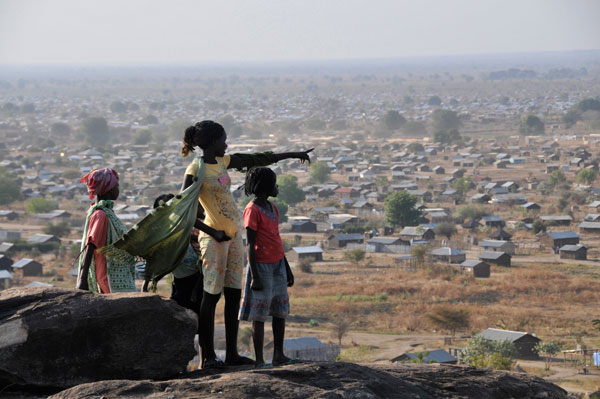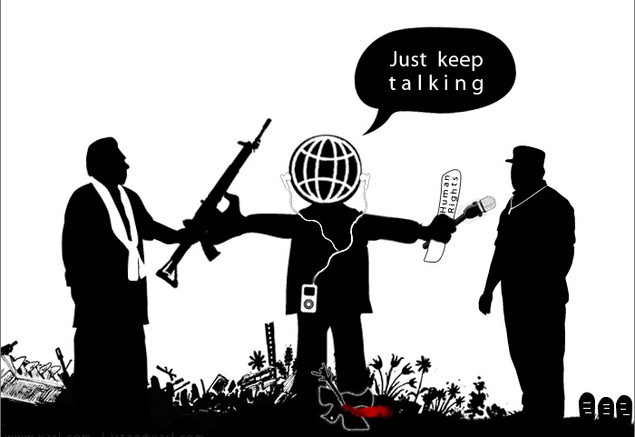Podiums with beaming politicians, press conferences and congratulatory letters to the editor with the familiar words “ the end of the Northern Uganda conflict” “ one of the worlds worst humanitarian conflicts” will no doubt accompany the signing of several agreements to bring to an end the 20-year rebellion led by reclusive Acholi fundamentalist and militarist Joseph Kony.
The agreements sealed in the southern Sudanese capital of Juba between the Ugandagovernment and the Lords Resistance Army (LRA) after a 19 month long internationally mediated negotiation has theoretically ended the war. They also promise to address the underlying causes of the rebellion.
However while the Juba pacts deliver an important psychological victory to the 1.2 million internally displaced people for whom the war has meant a hellish existence- its too early to call the current situation the “end” of the northern Uganda conflict.
This because closure in this conflict depends heavily on dismantling the military machine of the LRA and its support networks as much as it does on closing the gap between marginalized ( largely non-bantu) northerners and their more privileged (mainly bantu) southerners.
While the Juba agreements address both issues, these are challenges that require much more.Uganda has entrenched ethnic politics. Firstly post independence political history has been almost evenly divided between northern hegemony in the Presidencies of Milton Obote, Idi Amin and others as well as southern control under the leadership of Yoweri Museveni whom the LRA rebellion has resisted since he assumed power in 1986.
The Uganda government has promised to undo this divide by reconstructing the North after the rebellion at a cost of over US$ 600 million following the Juba agreements. But ethnicised corruption, a weak economy and grave challenges to Museveni’s legitimacy suggest a tough road ahead.
Secondly while LRA was a home grown rebellion, it is also a regional force. The 18 years of Museveni’s tenure in office has been accompanied by an interventionist foreign policy which led to Ugandan participation in the recreation of the region. The new governments In Burundi, Rwanda, Democratic Republic of Congo (DRC) and South Sudan are in part a result of this policy which has been costly in human and money terms.
LRA became a force used against Uganda and its ally the Sudan Peoples Liberation Army by the government of Khartoum. Disarming the LRA is improbable without addressing some of this regional baggage.
For a start it is unlikely that Kony will voluntarily give up control of the LRA nor will he give himself up for trial to answer for crimes committed by the group. Especially if it is still a player in regional security competition between the Khartoum regime and the Government of South Sudan [GoSS].
Last year, keen to prepare for what he believed would be a military showdown between his forces and the Ugandan army, Kony purged the LRA of “moderates” who saw the Jubaprocess as a credible exit including his long time deputy, Vincent Otti. A spate of defections then rocked the LRA that many hailed as a sign of the weakening of the group. But it also meant that Kony is now surrounded by loyalists and radicals. There are reports the LRA has continued to receive weapons and intelligence support from Khartoum (the rebels seem well equipped with cash, weapons and satellite phones).
The quick successes in Juba have been a stark contrast to reports the rebels are taking defensive positions in Garamba forest, splitting their forces into a frontal and rear guard with the latter moving towards the Central Africa Republic. Worse a splinter group of LRA may be active led by Ceaser Acelam- an Otti loyalist.
In Sudan, close to 10,000 people are displaced by alleged LRA attacks in Central andWestern Equatoria while Ugandan security sources suspect the group of cultivating contacts with former members of West Nile rebel groups. One of the biggest challenges of Juba is the question of whether it addresses the future of Kony himself. For all the talk, mediators and negotiators are scratching their heads over how the rebel group will dismantle with no credible answers on what will happen to Kony.
The military consolidation of the LRA has been picked up by the Ugandan army which has consequently drawn up plans to attack the rebels, referred to in military circles as “Plan B”. The situation in Southern Sudan is precarious because of the weak authority of GoSS.
Moreover, though I have made the suggestion to policy makers and politicians, particularly in Washington and Kampala, little has been done to engage the Khartoum regime in supporting the peace process. One of my hopes was that the Khartoum regime be approached with a view to providing internal exile for Kony for a limited period of time after the agreements are signed.
GOSS has been unable to enforce the assembly of Kony’s forces in designated areas during the initial phases of the Juba talks. There is no sign it can participate in the disarming of the rebels should force be required.
Without the muscle to break up the LRA, the Juba agreements could instead assemble some incentives for the war to continue, offering Museveni legitimate grounds to pursue military options. It does better for the rebels. Before Juba the LRA was a fringe military group whose brutal methods made them inaccessible to many Northern Ugandans.
Now the rebels can profess political causes linked to the common fate of the bitter geographical north. One of the agreements on “sharing the national cake” with northerners is an admission that the greater north have been unequal partners in the relative prosperity and stability of Uganda. Most people in Acholi and other affected districts especially political and Diaspora leaders may have welcomed the relief from war conditions that Juba has ultimately become but still blame the government for the humanitarian crisis of the last 20 years.
Not uncommon is the view that the Museveni government had a policy of deliberate neglect in the region. To avoid a violent conclusion to this contest Kony must be dealt with and the LRA dismantled while the Uganda government must pay more than lip service in ending the economic, social and political exclusion of the North. This of course is easier said than done.
ANGELO IZAMA
Submitted to the Independent Newspaper, Kampala Uganda










